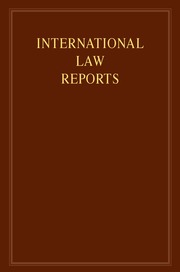No CrossRef data available.
Article contents
Babar v. Secretary of State for the Home Department
Published online by Cambridge University Press: 26 August 2022
Abstract
Aliens — Refugee status — Convention relating to the Status of Refugees, 1951 — Article 1F(a) — Exclusion from protection — Crimes against humanity — Removal of respondent to home country breaching Article 3 of European Convention on Human Rights, 1950 — Respondent granted leave to remain in United Kingdom — Whether respondent entitled to indefinite leave to remain in United Kingdom — Public interest in removal of respondent to Pakistan appropriate — Whether compelling circumstances outweighing public interest
Relationship of international law and municipal law — Convention relating to the Status of Refugees, 1951 — Article 1F(a) — Exclusion from protection — Crimes against humanity — Removal of respondent to home country breaching Article 3 of European Convention on Human Rights, 1950 — Respondent granted leave to remain in United Kingdom — International crimes — Respondent’s lawful behaviour and family ties since alleged involvement in international crimes — Whether constituting compelling circumstances outweighing public interest in denying settlement in United Kingdom
International criminal law — Crimes against humanity — Denial of settlement in United Kingdom to those who have committed crimes against humanity — Whether proper weight given to this factor — United Kingdom’s international obligations — United Kingdom’s international standing — Purpose of Article 1F of Convention relating to the Status of Refugees, 1951 — Accountability for actions — Upholding international rule of law — Whether compelling circumstances to grant respondent indefinite leave to remain in United Kingdom — Whether in public interest for respondent to be removed to Pakistan — The law of England
- Type
- Case Report
- Information
- Copyright
- © Cambridge University Press & Assessment 2022




